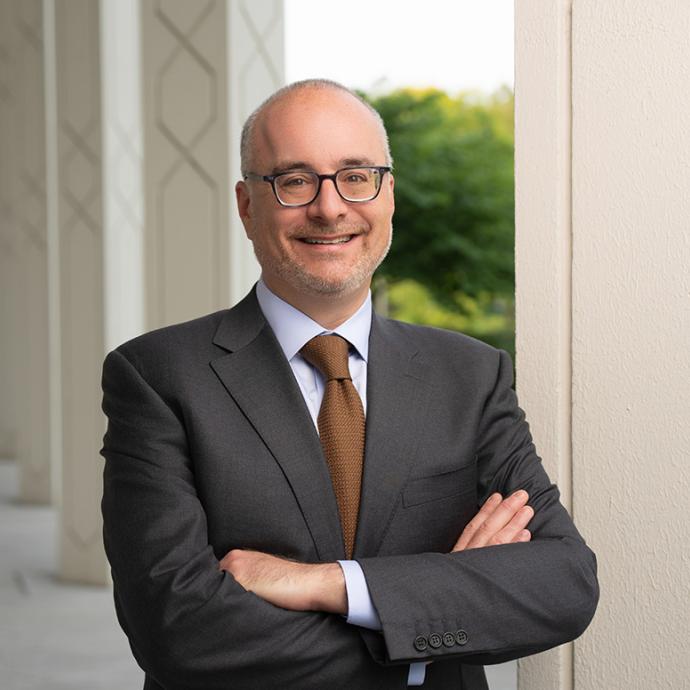Stephen A. Schwarzman believes in growing a network of global leaders, and to do so he has set out to finance educating young scholars about China, one of the world’s leading nations.
Inspired by the Rhodes Scholarships program, the new Schwarzman Scholars program will enroll its inaugural cohort of 111 master’s students in 2016. Among the recipients announced on Jan. 11, are two fourth-year UChicago College students: Enkhmend Gereltogtokh, a student of Environmental Studies and Economics, and Tyler Ross, a student of Public Policy and Economics.
“The caliber of this first class of Schwarzman Scholars is truly exceptional,” said Schwarzman. “Each scholar has demonstrated tremendous leadership potential at a young age and differentiated themselves through myriad academic and non-academic pursuits. It is my intention that the Schwarzman Scholars will return home and provide leadership in a changing, complex and dynamic world. I have every confidence that this class will be such leaders,” the program founder added.
The Schwarzman Scholars program is one of the most selective in the world. Evaluations by application readers are followed by interviews with panels of distinguished CEOs, former heads of state, university presidents, executives of non-profit organizations and other leaders from around the globe. Gereltogtokh and Ross were among 3,000 applicants and were chosen from 300 semifinalists.
The chairman, CEO and co-founder of Blackstone, Schwarzman founded the scholarship program in China with a $100 million personal gift and a philanthropic commitment to raise another $300 million to endow the program.
The Schwarzman Scholars will attend Schwarzman College at Tsinghua University in Beijing to study in one of three fields: public policy, economics and business or international studies. Tsinghua is consistently ranked as one of the top higher learning institutions in China.
“We take great pride in knowing that students in the College were selected to study at Tsinghua University in Beijing in the inaugural year of this prestigious fellowship,” said John W. Boyer, dean of the College and the Martin A. Ryerson Distinguished Service Professor of History and in the College. “Out of 3,000 applicants from more than 130 countries, two of our students will join an international group of scholars to further global educational opportunities and scholarship for the University of Chicago,” he said.
Schwarzman has said the success of future leaders will require an understanding of China and its role in global trends. Therefore, immersion in an environment of intellectual engagement, professional development and cultural exchange will build a foundation for these scholars as they pursue their academic disciplines and expand their leadership capacities.
UChicago recipients described their aspirations as Schwarzman Scholars in their applications. Here’s a synopsis of what they wrote.
Identifying as both an American and a Mongolian, Enkhmend Gereltogtokh has a vested interest in interpreting cultural differences between societies. In what he calls a “shrinking world—a place where people of different origins and views are ever more exposed to one another,” there is a need for such work.
“It is this urge that drives me to further my abilities for creative thinking, data-informed decision-making and cultural mediation,” wrote Gereltogtokh, “the key components of my take on interpretation and societal improvement.”
Gereltogtokh was awarded a Ward Research Grant to conduct interviews and gather data for his thesis on the redevelopment of “ger districts,” improvised settlements that lack basic urban services, in Ulaanbaatar, Mongolia. He believes the solution for helping the country’s impoverished populations lies in better relationships with its neighbors. China, for example, has had success with public-private partnerships, which could be used in Mongolia to promote accountability and effective cost-management.
“Becoming a Schwarzman Scholar would provide an extraordinary opportunity to form enduring relationships that will further my capacities for interpretation,” Gereltogtokh said. “The possibilities for collaboration into the long term are limitless.”
Self-described as “never content to be idle,” Tyler Ross’ energy and focus has led him to establish an undergraduate moot court program at the University of Chicago, help create the Chicago Peace Corps as an inaugural Shriver fellow and conduct an independent research project on the air pollution crisis in Beijing, among other accomplishments.
An economics and public policy major, Ross is interested in using policy measures like incentive systems to tackle major urban problems such as pollution, crime and poverty. He believes China, with lower poverty and unemployment rates than the United States, has fundamental lessons to offer about policy.
“Understanding incentive systems in China will lead me to become a better practitioner and policy advisor domestically,” Ross wrote, pointing out that many safety net programs can reinforce the cycle of poverty.
Ross looks forward to continuing his anti-poverty work, with the goal of finding a position in government or with a national nonprofit in the United States.
“I know that continued experience with China and the Schwarzman program will not only prepare me to identify and develop solutions, but also will make me a stronger and more effective leader,” he wrote.
Ross and Gereltogtokh were assisted in making application to the Schwarzman Scholarship program by the College Center for Scholarly Advancement, a new office in the College that informs undergraduates about national scholarship, fellowship and postgraduate opportunities and helps them through the highly competitive application processes.










 —Prof. Kunle Odunsi
—Prof. Kunle Odunsi
